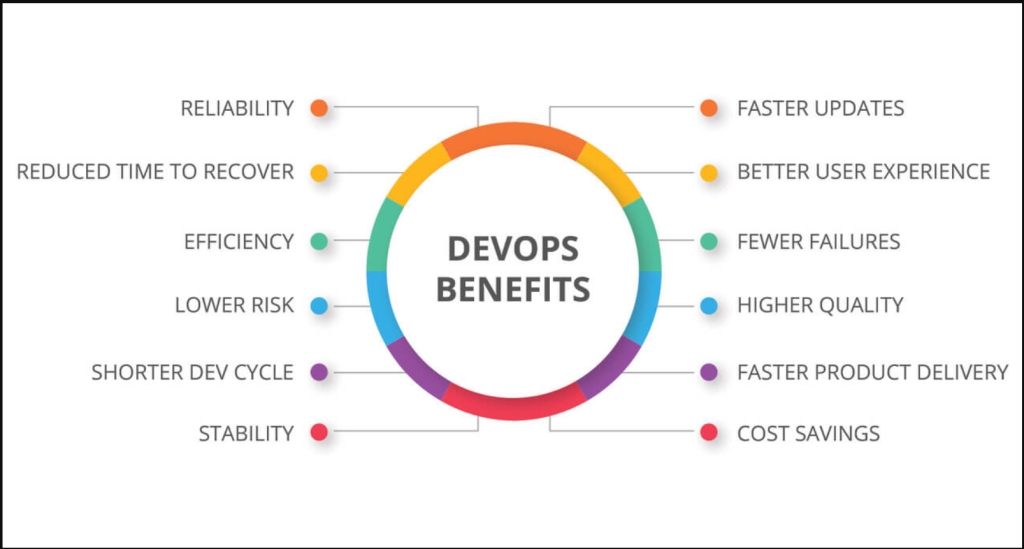Upgrade & Secure Your Future with DevOps, SRE, DevSecOps, MLOps!
We spend hours on Instagram and YouTube and waste money on coffee and fast food, but won’t spend 30 minutes a day learning skills to boost our careers.
Master in DevOps, SRE, DevSecOps & MLOps!
Learn from Guru Rajesh Kumar and double your salary in just one year.

DevOps offers significant advantages for IT operations by fostering a culture of collaboration and automation between development and operations teams. This integration leads to faster deployment of applications, as continuous integration and continuous deployment (CI/CD) pipelines streamline the release process, reducing time-to-market. Automation of routine tasks minimizes human errors and allows IT personnel to focus on more strategic initiatives. Moreover, continuous monitoring and real-time feedback loops enable proactive issue detection and resolution, enhancing system reliability and uptime. By breaking down silos and promoting shared responsibilities, DevOps also improves communication and efficiency across teams, leading to more stable and predictable operating environments. Overall, adopting DevOps practices results in increased agility, better resource utilization, and a more resilient IT infrastructure.
The Essence of DevOps
DevOps is a methodology that emphasizes the seamless integration of software development and IT operations. By promoting a collaborative culture, it breaks down traditional silos, enabling cross-functional teams to work in unison throughout the software development lifecycle. This integration is facilitated through practices such as continuous integration (CI), continuous delivery (CD), and the adoption of automation tools, all aimed at accelerating the deployment of high-quality software.

Transformative Benefits of DevOps for IT Operations
- Enhanced Collaboration and CommunicationTraditional IT operations often suffer from a disconnect between development and operations teams, leading to inefficiencies and misunderstandings. DevOps addresses this by fostering a culture of shared responsibility and open communication. Regular interactions and collaborative planning sessions ensure that both teams are aligned with organizational goals, resulting in more cohesive and efficient workflows.
- Accelerated Deployment and Time-to-MarketIn the competitive business environment, the ability to deploy applications swiftly is crucial. DevOps practices, particularly CI/CD pipelines, automate the building, testing, and deployment processes, significantly reducing the time required to bring new features or applications to market. This acceleration not only meets customer demands promptly but also provides a competitive edge.
- Improved System Reliability and Stability System downtime can have severe repercussions, including financial losses and diminished customer trust. DevOps enhances system reliability through automated testing and continuous monitoring. Automated testing ensures that code changes are validated before deployment, reducing the risk of introducing errors. Continuous monitoring provides real-time insights into system performance, allowing for proactive issue resolution and maintenance.
- Increased Efficiency through AutomationManual processes in IT operations are often time-consuming and prone to errors. DevOps leverages automation to handle repetitive tasks such as code integration, testing, and deployment. This not only speeds up processes but also minimizes human error, leading to more consistent and reliable outcomes. Automation frees IT personnel to focus on strategic initiatives that drive innovation and add value to the organization.
- Cost Reduction Implementing DevOps can lead to significant cost savings. By reducing system downtimes through proactive monitoring and rapid issue resolution, organizations can avoid the substantial costs associated with outages. Additionally, efficient resource utilization and streamlined processes contribute to overall cost efficiency.
- Enhanced Security and Compliance Security is a paramount concern in IT operations. DevOps integrates security practices into the development and operations processes, a practice known as DevSecOps. This approach ensures that security is considered at every stage of the software lifecycle, leading to more secure systems and easier compliance with industry regulations.
- Scalability and Flexibility As businesses grow, their IT infrastructure must scale accordingly. DevOps practices support efficient scaling of applications and infrastructure. Through automated configuration management and infrastructure as code (IaC), IT operations can quickly adapt to changing demands, ensuring optimal performance under varying workloads.
Implementing DevOps in IT Operations
The successful adoption of DevOps requires a strategic approach that encompasses cultural transformation, process reengineering, and the deployment of appropriate tools.
- Cultural TransformationFostering a culture that values collaboration, continuous learning, and shared responsibility is fundamental. Encouraging open communication and breaking down silos between development and operations teams lay the foundation for successful DevOps implementation.
- Process AutomationIdentifying repetitive tasks and implementing automation tools can streamline workflows. Automated testing, deployment, and monitoring not only enhance efficiency but also reduce the likelihood of human error.
- Continuous Integration and Continuous Deployment (CI/CD)Establishing CI/CD pipelines enables frequent and reliable code deployments. This practice ensures that code changes are continuously tested and deployed, facilitating rapid delivery of new features and bug fixes.
- Infrastructure as Code (IaC)Utilizing IaC practices allows for the management and provisioning of infrastructure through code. This approach ensures consistency, reduces configuration drift, and enables efficient scaling of resources.
- Continuous Monitoring and Feedback Loops Implementing comprehensive monitoring provides real-time insights into system performance. Establishing feedback loops ensures that information is continuously fed back into the development process, facilitating ongoing improvements and quick issue resolution.
Challenges and Considerations
While the benefits of DevOps are substantial, organizations must be mindful of potential challenges:
- Resistance to ChangeTransitioning to a DevOps culture may encounter resistance from staff accustomed to traditional workflows. Addressing concerns through training and clear communication is essential to facilitate acceptance.
- Tool IntegrationSelecting and integrating the right set of tools that align with organizational needs can be complex.

 Starting: 1st of Every Month
Starting: 1st of Every Month  +91 8409492687 |
+91 8409492687 |  Contact@DevOpsSchool.com
Contact@DevOpsSchool.com